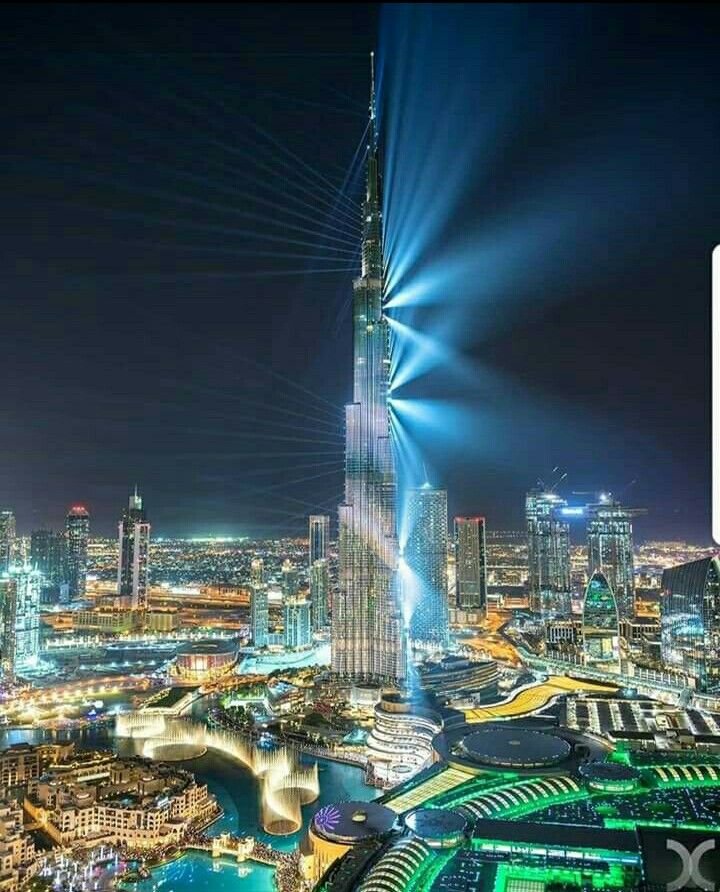
Dubai emerged as a global city and business hub of the Middle East.[8] It is also a major transport hub for passengers and cargo. By the 1960s, Dubai's economy was based on revenues from trade and, to a smaller extent, oil exploration concessions, but oil was not discovered until 1966. Oil revenue first started to flow in 1969.[9] Dubai's oil revenue helped accelerate the early development of the city, but its reserves are limited and production levels are low: today, less than 5% of the emirate's revenue comes from oil.[10]
The Emirate's Western-style model of business drives its economy with the main revenues now coming from tourism, aviation, real estate, and financial services.[11][12][13] Dubai was recently named the best destination for Muslim travellers by Salam Standard.[14] Dubai has recently attracted world attention through many innovative large construction projects and sports events. The city has become iconic for its skyscrapers and high-rise buildings, in particular the world's tallest building, the Burj Khalifa. Dubai has been criticised for human rights violations concerning the city's largely South Asian and Filipino workforce.[15] Dubai's property market experienced a major deterioration in 2008–09 following the financial crisis of 2007–08,[16] but the emirate's economy has made a return to growth, with a projected 2015 budget surplus.[17]
As of 2012, Dubai was the 22nd most expensive city in the world and the most expensive city in the Middle East.[18][19] In 2014, Dubai's hotel rooms were rated as the second most expensive in the world, after Geneva.[20] In 2013, U.S. global consulting firm Mercer rated Dubai the best place to live in the Middle East.[21]
Etymology Edit
Many theories have been proposed as to the origin of the word "Dubai". first and the most probable theory says that Dubai is the Arabicized form of Persian word "Dopey" which means "two bases" and refers to the inlet (خور) which passes through the City and divides it into two parts. Another theory suggests the word was used to describe the souq, which was similar to the souq in Ba.[22] An Arabic proverb says "Daba Dubai" (Arabic: دبا دبي), meaning "They came with a lot of money."[23] According to Fedel Handhal, a scholar on the UAE's history and culture, the word Dubai may have come from the word daba (Arabic: دبا) (a past tense derivative of yadub (Arabic: يدب), which means "to creep"), referring to the slow flow of Dubai Creek inland. The poet and scholar Ahmad Mohammad Obaid traces it to the same word, but to its alternative meaning of "baby locust" (Arabic: جراد) due to the abundant nature of locusts in the area before settlement.[24] An inhabitant or native of the city is a Dubaian.[25]
History Edit
Main articles: History of Dubai and Timeline of Dubai
Typical scene in old Dubai, Old District of Al Bastakiya
Although stone tools have been found at many archaeological sites, little is known about the UAE's early inhabitants as only a few settlements have been found.[26] Many ancient towns in the area were trading centres between the Eastern and Western worlds. The remnants of an ancient mangrove swamp, dated at 7000 BC, were discovered during the construction of sewer lines near Dubai Internet City. The area was covered with sand about 5,000 years ago as the coast retreated inland, becoming part of the city's present coastline.[26][27] Pre-Islamic ceramics have been found from the 3rd and 4th centuries.[28] Prior to the introduction of Islam to the area, the people in this region worshiped Bajir (or Bajar).[28] After the spread of Islam in the region, the Umayyad Caliph of the eastern Islamic world invaded south-east Arabia and drove out the Sassanians. Excavations by the Dubai Museum in the region of Al-Jumayra (Jumeirah) found several artefacts from the Umayyad period.[29]
The earliest recorded mention of Dubai is in 1095 in the Book of Geography by the Andalusian-Arab geographer Abu Abdullah al-Bakri.[citation needed] The Venetian pearl merchant Gasparo Balbi visited the area in 1580 and mentioned Dubai (Dibei) for its pearling industry.[29]
Dubai is thought to have been established as a fishing village in the early 18th century[30] and was, by 1822, a town of some 7–800 members of the Baniyas tribe and subject to the rule of Sheikh Tahnoon of Abu Dhabi.[31]
In 1833, following tribal feuding, members of the Al Bu Falasa tribe seceded from Abu Dhabi and established themselves in Dubai. The exodus from Abu Dhabi was led by Ubaid bin Saeed and Maktum bin Butti who became joint leaders of Dubai until Ubaid died in 1836, leaving Maktum to establish the Maktoum dynasty.[30]
Dubai signed the first treaty of Perpetual Maritime Truce in 1820 along with other Trucial States, which was followed by a further treaty in 1853. It also – like its neighbours on the Trucial Coast – entered into an exclusivity agreement in which the United Kingdom took responsibility for the emirate's security in 1892.
Two catastrophes struck the town during the 1800s. First, in 1841, a smallpox epidemic broke out in the Bur Dubai locality, forcing residents to relocate east to Deira. Then, in 1894, fire swept through Deira, burning down most homes.[32] However, the town's geographical location continued to attract traders and merchants from around the region. The emir of Dubai was keen to attract foreign traders and lowered trade tax brackets, which lured traders away from Sharjah and Bandar Lengeh, the region's main trade hubs at the time. Persian merchants naturally looked across to the Arab shore of the Persian Gulf finally making their homes in Dubai. They continued to trade with Lingah, however, as do many of the dhows in Dubai Creek today, and they named their district Bastakiya, after the Bastak region in southern Persia.[32][33]
Dubaiis the tansaction point all over the world.